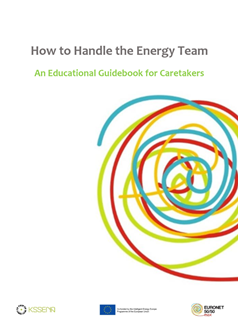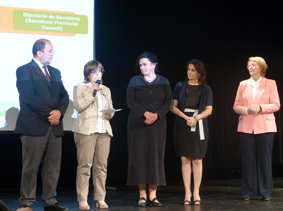Was ist neu im Projekt?
Energy savings achieved in Slovenian schools
Passing the baton in the School Complex in Čáslavice, Czech Republic
News from Cyprus
In total 40 teachers and 136 students are directly involved in the project, while more than 1900 are involved indirectly. Dedicated meetings were attended by the headmaster, the teachers coordinating the work of the energy team and - in some cases - also the students participating in the team. CEA\'s staff explained the attendants how to implement the 50/50 methodology step by step, how to use presented measuring devices, as well as went through the educational booklet and the lesson scenarios in order for the teachers to feel comfortable with them. Before the meetings, the schools were also asked to gather and provide electricity and heating bills, which will be later used to calculate the energy savings.
The overall feedback received from schools was positive and encouraging! The teachers highlighted that educational boxes will facilitate their work with the energy teams a lot. The students were really enthusiastic with the measuring devices, the posters and other material provided. The headmasters and teachers understood the 50/50 methodology and committed to engage all building users in the school’s efforts to save energy.
Evaluation of the first year of implementation of the 50/50 concept
The 1st cycle of implementation of the 50/50 methodology has been completed and it's time for its evaluation! We asked representatives of schools and other public buildings involved in the project about their experiences, opinions and suggestions for the future. Two questionnaires were prepared (for schools and for other buildings) and translated into all project languages. The feedback was collected via an e-form, which significantly simplified the process.
In total 314 schools and 12 other public buildings filled in the questionnaire and the feedback received was very positive. Most of the schools consider the project very interesting and useful, both from the pupils' and the teachers point of view. They believe that it has a lot of positive impacts and that - as a result - energy awareness, knowledge and consumption habits of the building users have changed a lot. There are, however, also some challenges that need to be tackled. The biggest one is finding time for project activities in the - rather hectic - everyday work schedule. The school days are full of action, the requirements of the curriculum need to be fulfilled and there are already many other projects going on. It is also challenging - especially in bigger schools - to get the whole school community involved, interested, aware and active. Still, the teachers put a lot of effort to successfully implement all steps of the 50/50 methodology, as they are convinced that saving energy and protecting the environment are so important, that they should be fitted in the school agenda anyway.

The experiences of the schools
EURONET 50/50 MAX on Facebook!
 We are pleased to announce that now you can follow our activities, as well as activities and achievements of schools and other public buildings involved in the 50/50 Network, on Facebook. Join us not only to learn from the others but also to share your valuable experience and opinions!
We are pleased to announce that now you can follow our activities, as well as activities and achievements of schools and other public buildings involved in the 50/50 Network, on Facebook. Join us not only to learn from the others but also to share your valuable experience and opinions!
There are over 500 schools, 60 municipalities and 48 other public buildings already involved in the EURONET 50/50 MAX project. Each of them has its own experience in energy education, energy saving and working with the energy teams. Use the opportunity to learn from them, get inspired by them and also share your own achievements, best practices and useful tips!
Link to our English Facebook profile is following: https://www.facebook.com/EURONETMAX
You may also follow country-level disputes on national Facebook profiles administered by EURONET 50/50 MAX partners. They can be accessed from different language versions of this website.
Once again, we would like to invite you to join our energy-saving community!
How to handle the energy team? Find answers in our new guidebook
 Our new guidebook entitled “How to handle the energy team” contains many useful tips how to organise energy tour around the school building and to help children analyze energy situation of their school. The publication is addressed to school caretakers who play very important role in the 50/50 project. As they best know the building, its energy system and appliances in use, they can help students find out how and where energy is used at school, as well as support them in implementation of energy-saving measures.
Our new guidebook entitled “How to handle the energy team” contains many useful tips how to organise energy tour around the school building and to help children analyze energy situation of their school. The publication is addressed to school caretakers who play very important role in the 50/50 project. As they best know the building, its energy system and appliances in use, they can help students find out how and where energy is used at school, as well as support them in implementation of energy-saving measures.
In the publication the caretakers will find guidelines how to organise the work with the energy team, how to prepare energy review of the school building, how to communicate with children and how to thoroughly discuss all energy sources used at school and necessary to its normal operation. The guidebook will also help caretakers to prepare for the possible questions raised by the pupils.
Although the guidebook is addressed to caretakers, also the teachers involved in the 50/50 project are invited to read the document. They will find here many useful information which they can use during their work with children, including information about model, low-cost energy-saving measures and modern technological solutions for clean and efficient energy production. It is worth to discuss them with students to increase their knowledge about energy production and consumption, however it should be remembered that bigger energy-related investment are not included in the EURONET 50/50 MAX project.
Informationsveranstaltungen für öffentliche Verwaltungen, Schulen und andere öffentliche Gebäude, die an EURONET 50/50 MAX beteiligt sind
Aktuell sind die Projektpartner damit beschäftigt, Schulen und andere öffentliche Gebäude für das EURONET 50/50 MAX-Projekt zu finden. Unser Ziel ist nicht einfach zu erreichen, sollen doch 500 neue Schulen und fast 50 andere öffentliche Gebäude teilnehmen. Aber das Interesse am 50/50-Konzept ist groß. Mehr und mehr Einrichtungen treten dem 50/50 Netzwerk bei.
Um den neuen Mitgliedern des Netzwerkes die Durchführung des 50/50-Projektes zu erleichtern, organisieren wir Trainings und Informationsveranstaltungen, bei denen die verschiedenen Aspekte des Projektes gründlich durchleuchtet werden. Die TeilnehmerInnen dieser Events lernen Schritt für Schritt, wie die 50/50-Methode angewendet wird und wie die erzielten Energieeinsparungen berechnet werden. Außerdem lernen sie die Musterverträge kennen, wie sie zwischen der teilnehmenden Kommune und der Schule bzw. einem anderen öffentlichen Gebäude abgeschlossen werden, sowie den Berichts-und Evaluationsprozess. Sie werden hier bald weitere Informationen über die Events in den einzelnen Ländern finden.
Sind Sie noch nicht Teil des 50/50-Netztwerks, aber möchten das Konzept in ihrem Gebäude umsetzten? Dann kontaktieren Sie uns bitte unter Diese E-Mail-Adresse ist vor Spambots geschützt! Zur Anzeige muss JavaScript eingeschaltet sein!.
Das erste EURONET 50/50-Projekt hat den „European Sustainable Energy Award 2013“ gewonnen!
 Wir sind überglücklich, dass das EURONET 50/50, das Vorläuferprojekt von EURONET 50/50 Max, den Sustainable Energy Europe Award 2013 in der Kategorie “Lernen” gewonnen hat! Die Auszeichnung wird von der Europäischen Kommission vergeben, um die besten Projekte im Bereich nachhaltige Energie zu würdigen und es auf europäischer Ebene bekannter zu machen. In diesem Jahr haben 244 Projekte teilgenommen. Es war ein harter Wettbewerb!
Wir sind überglücklich, dass das EURONET 50/50, das Vorläuferprojekt von EURONET 50/50 Max, den Sustainable Energy Europe Award 2013 in der Kategorie “Lernen” gewonnen hat! Die Auszeichnung wird von der Europäischen Kommission vergeben, um die besten Projekte im Bereich nachhaltige Energie zu würdigen und es auf europäischer Ebene bekannter zu machen. In diesem Jahr haben 244 Projekte teilgenommen. Es war ein harter Wettbewerb!
Die Preisverleihung fand am 24. Juni im Rahmen der Europäischen Woche der nachhaltigen Energie in Brüssel statt. Der Preis für EURONET 50/50 wurde von einer Vertreterin der Provinzverwaltung Barcelona entgegen genommen, die die Koordinatoren des Projektes war.
Diese Auszeichnung bestätigt, dass das Projekt EURONET 50/50 ein großer Erfolg war und es sich auszahlt, das 50/50-Konzept weiter unter europäischen Behörden, Bildungszentren und Managern von anderen öffentlichen Gebäuden zu verbreiten. Nach so einem großartigen Start sind wir überzeugt, dass das Folgeprojekt EURONET 50/50 MAX noch bessere Ergebnisse bringen wird!
Startschuss für das EURONET 50/50 MAX Projekt
Wir freuen uns, dass das neue Projekt EURONET 50/50 MAX mit einer Eröffnungskonferenz und einem ersten Projekt-Meeting am 13. und 14. Mai in Brüssel offiziell gestartet wurde.
Die 50/50-Konferenz mit dem Titel “Anreize und Möglichkeiten zu Energiesparen für Schulen und andere öffentliche Gebäude” hatte zum Ziel, die Ergebnisse des ersten EURONET 50/50-Projektes zu verbreiten und das 50/50-Konzept unter europäischen Institutionen zu bekannter zu machen. Das Event begann mit Präsentationen der Europäischen Kommission (VertreterInnen der EACI, Betreiber des Intelligent Energy Programms, und von der Generaldirektion Bildung und Kultur) und des Konvent der Bürgermeister, die den Beitrag des Projektes zur Erreichung der europäischen Klima- und Energieziele hervorhoben.
Die Konferenz bot darüber hinaus die Möglichkeit, aus den Erfahrungen und Erfolgen des ersten 50/50-Projektes und der Realisierung des 50/50-Konzeptes zu lernen. Sehr motivierende Vorträge wurden von VertreterInnen des Cornellà Councils, der finnischen Schule Länsimetsän koulu und der Stadt Hamburg (die erste Stadt, die die 50/50-Methode angewendet hat) gehalten. Die Konferenz bot aber auch eine hervorragende Gelegenheit, offiziell über den Start der zweiten Auflage des EURONET 50/50-Projektes unter dem Titel EURONET 50/50 MAX zu informieren. Das neue Projekt soll noch eindrucksvollere Ergebnisse liefern, indem 500 neue Schulen in das Netzwerk eingebunden werden und das Konzept auch in anderen öffentlichen Gebäuden angewandt wird.
Begleitend zur Konferenz wurde ein Treffen der Projektpartner durchgeführt, auf dem die zukünftigen Aufgaben und angestrebten Ziele auf europäischer und nationaler Ebene diskutiert wurden.



















 Die alleinige Verantwortung für den Inhalt dieser Webseite liegt bei den AutorInnen. Er muss nicht unbedingt die Meinung der Europäischen Union wiederspiegeln. Weder die EACI noch die Europäische Kommission sind für jegliche Verwendung der darin enthaltenen Informationen verantwortlich.
Die alleinige Verantwortung für den Inhalt dieser Webseite liegt bei den AutorInnen. Er muss nicht unbedingt die Meinung der Europäischen Union wiederspiegeln. Weder die EACI noch die Europäische Kommission sind für jegliche Verwendung der darin enthaltenen Informationen verantwortlich.